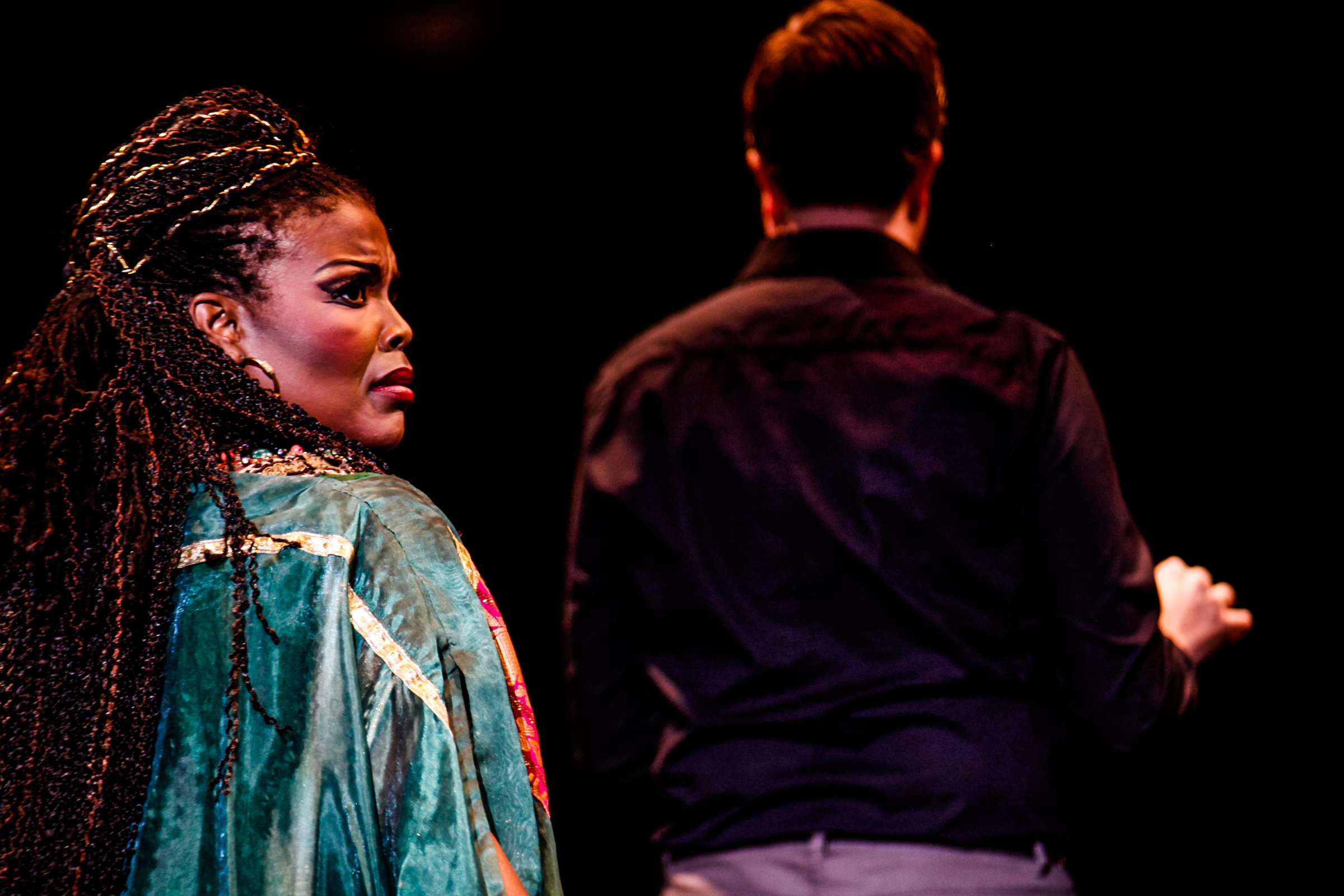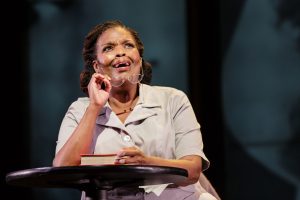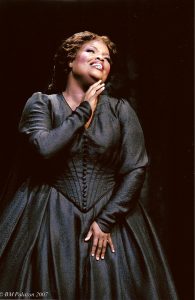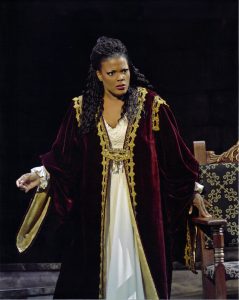
Angela Brown in North Carolina Opera’s “Aida” – Courtesy of Tim Lytvinenko. Used with permission.
The last time I saw internationally acclaimed opera star Angela Brown was when she performed her signature show “Opera…from a Sistah’s Point of View” (which I wrote about here) at George S. Buck School back in November. The Indianapolis native’s engaging interactive show was made possible by a Create Indy grant to her nonprofit Morning Brown, Inc. Dedicated to bringing live performances to underserved students, Brown’s organization partners with Indianapolis Opera to build awareness and community alliances for opera throughout Indiana.

Angela Brown – Courtesy of Indy Wise Shots. Used with permission.
For those unfamiliar with opera or Brown’s stellar career, it’s important to understand what an incredible ambassador for Indianapolis she has been throughout the world. Brown’s multi-genre career has been lauded on the front page of The New York Times, on CNN, CBS, and in Oprah Magazine and Reader’s Digest. With classical and pops engagements spanning six continents, the soprano has graced the leading opera and symphonic stages of the world. Her vocal artistry is featured on the two-time Grammy Award-winning recording “Ask Your Mama.” Brown has also had frequent engagements in Indianapolis, including her stint as co-host with Josh Kaufman in Indianapolis Symphony Orchestra‘s “Yuletide Celebration” in 2018 and host of two others previous to that.
Regular readers of the blog know in lieu of show reviews during the pandemic, I’ve been concentrating on profiling artists and arts organizations. I have been particularly interested, in the wake of George Floyd’s murder and the global Black Lives Matters protests, in telling the stories of artists of color. In so doing, I would be remiss if I didn’t spotlight Brown, who shines as one of the world’s brightest African-American stars. At the same time, I was prompted to speak to Brown after I read a July 16 story in The New York Times titled “Opera Can No Longer Ignore its Race Problem,” which detailed systemic racism in the opera world.
I spoke to the affable singer by phone from her far Northside home, which she shares with her husband Blaise Argelier, whom she met in Paris, and her 24-year old stepson Darshan. When asked how she’s been spending time during the lockdown, Brown said she’s been concentrating on things she loves and now has time for activities such as cooking vegan and alkaline-diet recipes, gardening, crafting and sewing, a skill she inherited from her mother Freddie Mae, who was a visual artist. She proudly points out that masks she is creating and are for sale, come in three styles: Afrocentric, classic and glam.
Shifting topics to her opinion of the NYT article, Brown concurred the piece was totally on target. “All of the singers who were interviewed are contemporaries of mine and their experiences mirror many of my own,” she said. “For instance, throughout my career, I have never seen a Black stage manager. Also, who you see on stage often times reflects who is in management and who sits on boards of opera companies all over the world.”

Angela Brown in “Charlie Parker’s Yardbird” – Courtesy of Dominic M. Mercier. Used with permission.
She said her experiences with racism in opera have been both overt and covert. For instance, in a Opéra national de Paris production of Verdi’s “Un Bal Masqué,” one of the leads wore Blackface and Brown’s makeup was purposely designed to make her look whiter. Another time she and her husband were at an opera-related, black-tie dinner, when a woman seated next to him made a remark, which he later repeated to her. “Your wife is so pretty. She doesn’t even have a Black nose,” said the clueless arts patron, apparently thinking she had extended a compliment.
As far as facing racism, in general, throughout her life Brown said, “I have been aware of my color since I was little. My parents warned me I would have racist experiences in my life and always told us we had to be better, two times better than the average white man or white woman. So, I always knew that I had to shine, regardless. Whatever I did, I had to bring excellence.”
“What changes would you like to see in opera?” I asked Brown. “There was a 1997 Disney television film, ‘Cinderella,’ starring Brandy,” she said. “I loved it because they cast to character, not to skin type. Whoopi Goldberg, who played the Queen, was the mother of the Prince who was Latinx. His father the King was Victor Garber who is white, and Whitney Houston was the Fairy Godmother. They just mixed it all up. I just loved it. I would love to see opera more diverse.”

Angela Brown in “Un Bal Masqué,” Courtesy of Opéra national de Paris. Used with permission.
Brown said her opera influences include “Leontyne Price, Jessye Norman, Kathleen Battle, Renata Scotto, Joan Sutherland, Grace Bumbry…the beat goes on. I have been fans of theirs ever since I started listening to their recordings. There were so many African-American singers who came way before me, who were trailblazers and paved the way.”
As we discussed whom she admires the most, she said, without hesitation, “My husband and son. They came from Paris to live in America. The French are racist too, but there is a whole new racism in America they haven’t been used to. And to see how strong they have been and how they have tried to navigate being Black in America is inspiring.” adding, “A bullet doesn’t know you are Afro-French and racist people wouldn’t care.” Brown expressed concerns about her son. “As soon as he speaks, everyone wants to know him because he has a French accent, but if he were just wearing a hoodie, carrying a bag of Skittles and a pop, walking through a certain neighborhood, he would be a threat to some.” To prove her point, Brown told me about how her son and a friend were looking at the ducks in a pond near their exclusive neighborhood when someone called the police on them. “’Why did the police have to be called? Mind your own business. This is his home,” she said. “So, I admire them because they have had to wear an additional layer of armor to be Black in America.”
“What do you hope the Black Lives Matter movement will accomplish?” I asked Brown. “We all want to be treated fairly. We all want equality. We all want a chance to strive and survive on our own merits in this country and to be seen as equal to the white man. That goes for my brown brothers and sisters as well. I just hope through this whole BLM situation that we come together as the HUMAN race and stop treating each other differently,” she said. “If you needed a pint of blood and I am your blood type, regardless of my race, you are going to take it if you want to live. We are our brother’s keepers, so we need to learn how to get along and be together as one. We are here and we are not going anywhere.”

Angela Brown in “Don Carlo” – Courtesy of Cincinnati Opera. Used with permission.
With an eye toward the clock, I wanted to make sure to ask about her upcoming projects before we said our goodbyes. A second season of her podcast “Melanated Moments in Classical Music,” which she co-hosts with music sociolgoist Joshua Thompson, produced in collaboration with Classical Music Indy, is in the works, though a release date has not yet been set. She will headline “Festival of Carols” with Indianapolis Symphonic Choir this December. Even though in-person performances are planned, Brown’s managers are working with ISC on a contingency plan, but the hope is they will present five shows. Still on Brown’s schedule is an appearance in “Porgy and Bess” with New Orleans Opera in the Spring of 2021. She was originally supposed to be in “Charlie Parker’s Yardbird” in May 2020, but instead of canceling contracts, the company chose to offer artists contracts for the next season. If all goes well, she will be singing Serena for them next year. Finally, two opera companies are planning to release a virtual performance of her “Opera…from a Sistah’s Point of View.” Brown’s team is hoping it will happen this fall. In the meantime, they are working to get everything in place and up to COVID-19 requirements. This version of the show will feature three to four emerging, young artists performing with Brown. She hopes to announce a release date soon.
Turning to some favorites questions I have asked all of my interviewees since the pandemic began, I posed to Brown, “What do you hope the new normal will be once we get past the pandemic?” She replied, “I hope to have jobs that will support my family. That we will have what we need and stay as healthy as we can. And that we not be so divided. I am hoping for the best.”
As for opera lovers, she advises, “Continue to support and go see opera. Here in America, other the NEA (National Endowment for the Arts), we don’t have government funding. We rely on patrons, so I would say if you love it, support it.” And for the general public, she said, “Keep your head up because trouble doesn’t last always. One of my favorite verses in the Bible is ‘and it came to pass’…and it will.”
For more information, visit angelabrown.com.





